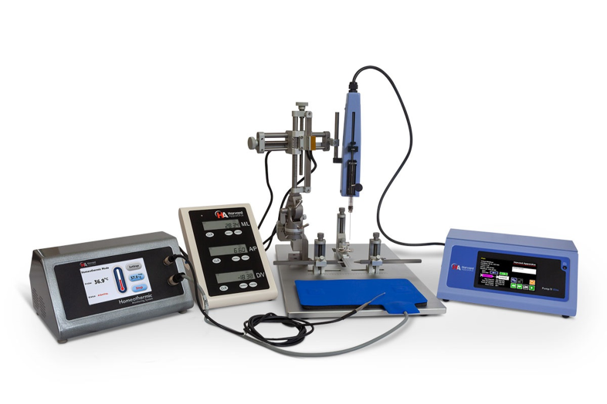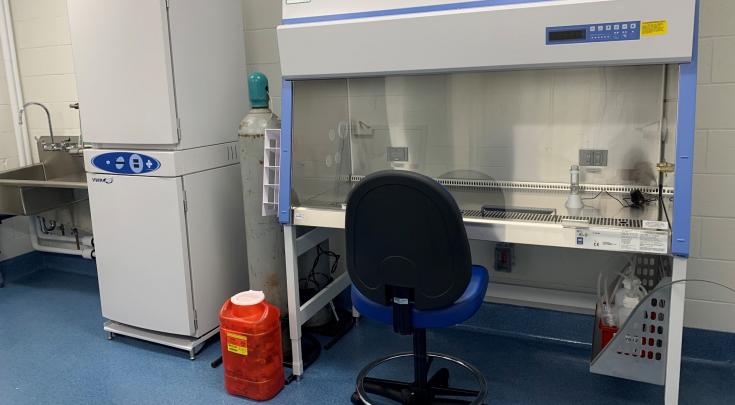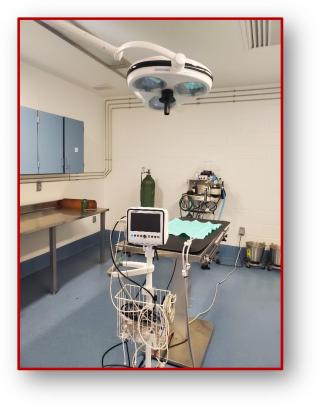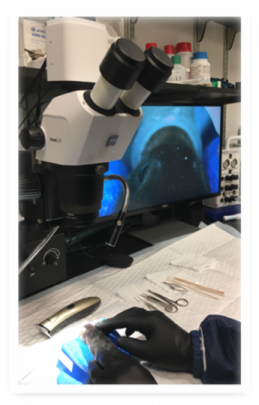In Vivo Research Services
Getting Started
Investigators interested in attaining in vivo research services can contact IVRS. During the session we will discuss the type of services investigators are seeking, understand your project needs and guide you to ensure all required preliminary needs are met prior to initiating your research.
- Rutgers Investigators must have an approved animal use protocol from the Institutional Animal Care & Use Committee (IACUC) (link) prior to utilizing IVRS services and animal facilities.
- External investigators can use animal facilities with or without technical assistance. The fee includes per diem charges, veterinary care, and regulatory fees. Rutgers has animal facilities suitable for rodents and large animal species including BSL 2, 3, and gnotobiotic facilities.
Services
Non-Surgical Services
- Rodent blood collection: submandibular (facial), sublingual, saphenous, tail vein, retro-orbital. Also blood collection from non-rodent species
- Routine substance administration: peroral gavage (PO), Intra-peritoneal (IP), subcutaneous (SC), intramuscular (IM), intravenous (IV)
- Advanced substance administration: intrathecal (IT), intranasal (IN), intra-orbital (IO), Intraventricular (ICV), intra-mammary gland, intra-cardiac injections
- Advanced techniques: cerebrospinal fluid (CSF) tap, Impactor weight-drop TBI model
- Terminal procedure support: euthanasia, microbial sampling, organ weights and harvesting, terminal blood collections, including cardiac puncture
- Non-invasive blood pressure measurement: Using mouse or rat tail
- In-house complete blood analysis (CBC) for multiple species
Surgical Services
- Vascular catheterization: jugular vein (JVC), carotid artery (CAC)
- Non-vascular catherization: bile duct, intrathecal, intracerebroventricle (IVC), lymph duct
- Soft tissue surgeries: splenectomy, hepatectomy, thymectomy, vasectomy, ovariectomy, vagotomy, pyloroplasty, double carotid occlusion, sub-renal capsule injection
- Alzet Pump implantations: subcutaneous or internal pumps
- Cardiac perfusion: mouse and rats
Animal Model Development
A team of experienced laboratory animal veterinarians and technical staff will work with you to develop the desired animal model in both rodents and non-rodent species. These include but not limited to:
- Dermal
- Neuroscience
- Diabetes and metabolic diseases
- Medical devices
- Inflammatory diseases
- Complex rodent surgical models
- Cancer models: Cell Line Derived Xenograft (CDX)and Patient-Derived Xenograft (PDX) efficacy models; Surgical metastatic tumor models
Training and Development
To ensure we meet expectations of our internal and external clientele, our team members go through continuing training to improve skills and many of these trainings are also available to our clients for their professional development.
We offer hands-on training in many areas including:
- Animal handling
- Rodent blood collection - submandibular (facial), sublingual, saphenous, tail vein, retro-orbital, cardiac puncture. Also blood collection from non-rodent species
- Routine substance administration - oral gavage (PO), intra-peritoneal (IP), subcutaneous (SC), intramuscular (IM), intravenous (IV), intradermal (ID)
- Advanced substance administration - Femoral artery injections (FA), intrathecal (IT), intranasal (IN), intra-orbital (IO), intraventricular (ICV), sub-renal capsule, intra-mammary gland, intra-cardiac injections
- Advanced techniques - cerebrospinal fluid (CSF) tap, cisterna magna injection
- Survival surgeries - Rodent Jugular vein cannulation (JVC), carotid artery cannulation (CAC), femoral vein cannulation (FVC)
Diagnostic Services
Parameters measured include:
- Blood electrolytes
- Enzymes
- Glucose
- Lipid
- Proteins
Complete Blood Count (CBC) Analysis
HESKA HT5 hematology analyzer provides a true 5-part White Blood Cell differential, Red Blood Cell and Platelet parameters using laser, impedance, and colorimetric technologies. Parameters measured include:
- White blood cell (WBC), total WBC number and % of neutrophils, lymphocytes, monocytes, eosinophils and basophils
- Red blood cell (RBC), hemoglobin, hematocrit, platelets, MCV, MCH, MCHC, MPV, Red Blood Cell Distribution (RDW-CV)
- Platelets: Total platelets (PLT) and Mean Platelet Volume (MPV)
Pricing
The facilities are operated on a fee-for-service basis. Users are charged based on the amount of time technicians spend performing the services. Fees for a variety of laboratory tests are processed through the CMR business office. IVRS fees are available in our core facilities iLab system.
For inquiries related to IVRS services please contact IVRS.
Consultation
Consultation services are available in the areas of In vivo experimental design, Animal model selection, Federal grants (SBIR/STTR) and on-site training workshops.
For research / corporate contracts and more information please contact IVRS office at: (848) 445-7333 or email IVRS.
Facility Procedures and Requirements
To follow federal regulations and accreditation requirements, all personnel must be appropriately trained prior to beginning work with the animals. The training program is essential to the success of the Rutgers’ research program by ensuring continued excellence in animal care and welfare. It ensures that those working with animals are knowledgeable in policies and proficient in procedures.
For step-by-step instructions on gaining access to the facilities, please visit CMR Training.
Rutgers Investigators must have an approved animal use protocol from the Institutional Animal Care & Use Committee (IACUC) prior to utilizing IVRS services and animal facilities.
External investigators can use animal facilities with or without technical assistance. The fee includes per diem charges, veterinary care, and regulatory fees. Rutgers has animal facilities suitable for rodents and large animal species including BSL 2, 3, and gnotobiotic facilities.




